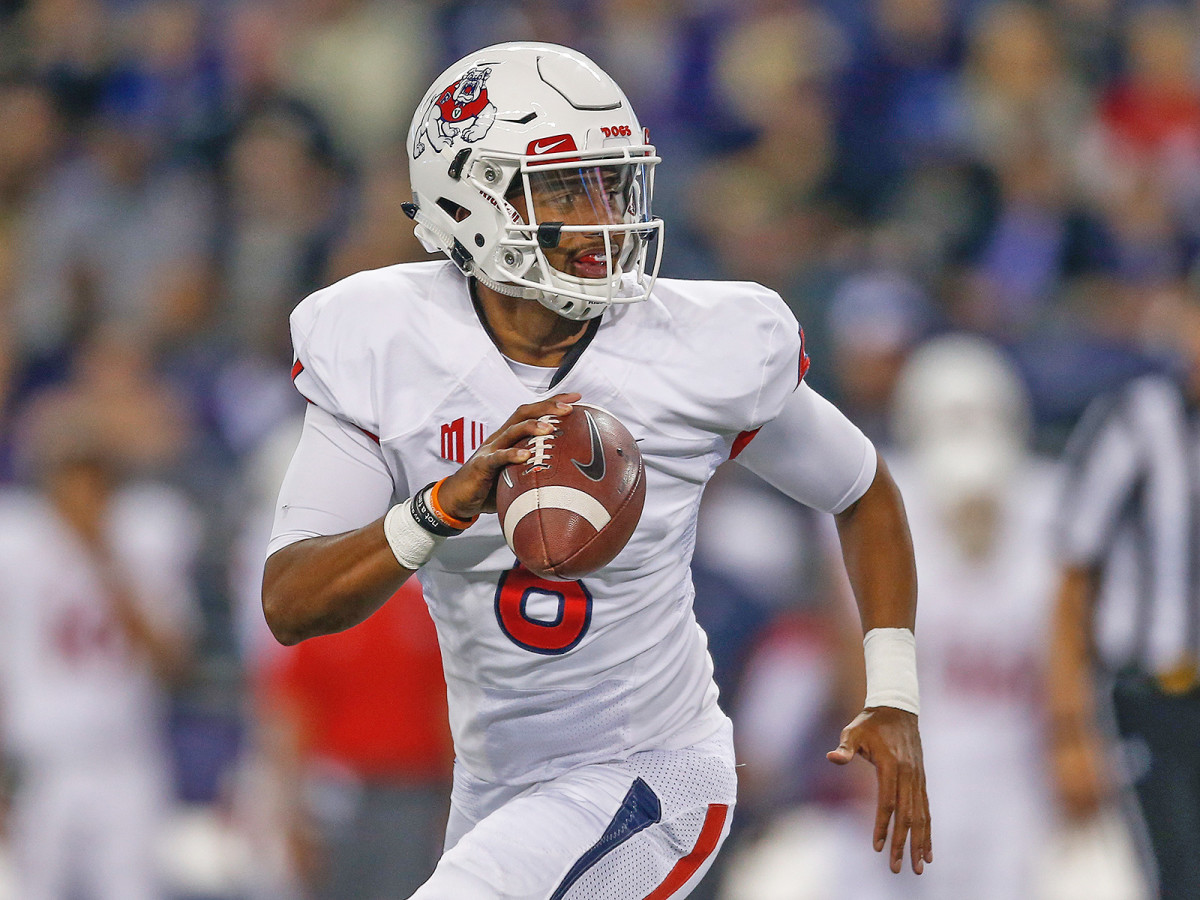This Year's UCF? These Group of Five Schools Could Make Noise in the Playoff Debate

An optimist might say last season was the best thing to happen to the Group of Five since the start of the College Football Playoff. UCF went undefeated and figured into the playoff conversation, providing fans a thrilling ride along the way.
A pessimist would probably say it was the worst. UCF went undefeated but finished No. 12 in the final College Football Playoff rankings, securing a New Year’s Six berth but dooming all future Group of Five hopefuls to a ceiling below the final four.
Maybe it was neither, and maybe it was both. The selection committee took a decent amount of criticism for its treatment of the Knights, but it’s impossible to say how much of that outcry reached its members’ ears or will figure into its future decision-making. At bare minimum, though, 2017 drew attention to a tier of teams that deserves a spot in the conversation.
UCF has a new coach but a familiar loaded roster, and it’s one of several Group of Five teams with a realistic hope of at least being mentioned in conjunction with a playoff spot. To get even as close as the 2017 Knights did, one of the seven teams below would need to go undefeated in dominant fashion. It’s still hard to see how any non-Power 5 teams make the final four, but these teams are good enough to dare to dream.
Boise State
This could be the best Boise State team since 2011, when the Broncos went 12–1 and finished No. 8 in the final AP Poll. And it’s not as if they have endured a major dropoff since then; over coach Brian Harsin’s four seasons, they have averaged 10.5 wins and finished in the Top 25 twice. This year’s team is loaded with experience and boasts the Mountain West’s best quarterback in Brett Rypien, who has plenty of experienced targets at receiver, even with Cedrick Wilson off to the NFL. The offensive line brings back four starters from 2017, and the only major departure on defense was linebacker Leighton Vander Esch. A year ago, Boise State finished 30th in Football Outsiders’ Defensive S&P+ metric, which measures a unit’s efficiency and explosiveness adjusted for quality of competition; with nine returning starters this season, it could be even better on that side of the ball. Combine that with Rypien in his fourth year as a starter, and it’s hard to see how this team won’t be very, very good.
The schedule, though, leaves something to be desired. Its nonconference slate opens with Troy, which has been good for a Power 5 upset every few years but doesn’t carry too much weight with the playoff committee, and then UConn. The Broncos do travel to Oklahoma State in Week 3, which will be the game that makes or breaks their playoff hopes.
Florida Atlantic
Lane Kiffin’s team looks poised to unseat UCF as the darlings of Florida this year—although as with any Kiffin team, there’s a way to envision this going south in a hurry. Still, if the Owls play like they did a season ago, when they finished 11–3 and ran the table in Conference USA, they have a good shot at an even better record. Working against them: They have to pick a new quarterback, and the decision comes down to two players with zero FBS starting experience in Chris Robison and De’Andre Johnson. But with 2017’s leading scorer Devin Singletary at running back, FAU has its speedy security blanket, and it’s hard to see the team falling off the marks it set a year ago, when it was the No. 6 rushing offense in the country. On defense, the best unit in Conference USA last year is unlikely to miss a beat with leading tackler Azeez Al-Shaair back.
The Owls’ aspirations to be anything more than repeat Conference USA champs come down to Week 1, when they travel to Oklahoma. If FAU can somehow catch the Sooners while they’re still ironing out the kinks of replacing Baker Mayfield, it should count itself lucky. Three weeks later, it gets UCF, and from there, it’s smooth sailing through a manageable conference slate. If you think the committee held the quality of competition in the AAC against UCF in its undefeated bid last year, just wait until they start breaking down FAU’s schedule.

UCF
Head coach Scott Frost is gone, as are star cornerback Mike Hughes and one-handed linebacker Shaquem Griffin, but the Knights bring back plenty of talent in 2018. New coach Josh Heupel—formerly Missouri’s offensive coordinator—should bring a similar level of aggression on offense as his predecessor, and it’s easy to expect UCF’s offense to keep on humming under the direction of junior quarterback McKenzie Milton. But that offense will have to put up big points to help out a defense that lost its biggest playmakers and will transition to a 4–3 front under new coordinator Randy Shannon. No Group of Five team that has made a New Year’s Six bowl one year has matched that season’s win total the next, and for UCF to do so would be incredible.
Probability is working against UCF, as is precedent. Still, the Knights play in the most respected Group of Five conference, and their slate includes two Power 5 teams: North Carolina and Pitt. Add in that FAU game, and they did well for themselves on the scheduling front.
San Diego State
Under coach Rocky Long, San Diego State always seems to be lurking. Since Long took over in 2011, the Aztecs have never finished under .500, posting 11–3, 11–3 and then 10–3 records in the past three years. They should be one of the Mountain West’s most complete teams: They lose the nation’s leading rusher Rashaad Penny, but his diminutive replacement Juwan Washington put up 759 yards and seven touchdowns as a backup last season, and on defense they bring back seven starters.
If the Mountain West is as strong as it looks on paper, the Aztecs’ schedule should help their case. They play Boise State in Week 6 and Fresno State in Week 12, but the season’s toughest tests come even earlier. Just as it did last year, San Diego State gets Stanford and Arizona State in September; it will have to go 2–0 against the Pac-12 for a second straight year to have any hope of playoff contention.
Mitch Wishnowsky and Utah Are Setting the Pace in a New Phase of the Australian Punter Pipeline
Memphis
The Tigers have been a blast to watch in recent seasons, withstanding the coaching transition from Justin Fuente to Mike Norvell in a fashion that should be encouraging to every hot Group of Five program worried about being just a stepping stone for its next hire. This season, they’re without quarterback Riley Ferguson and receiver Anthony Miller, which will be a blow to an offense that put up 532.1 yards per game in 2017, fourth in the nation. In order for Memphis to improve upon its 10–3 finish, its defense will need to step up. Last year, the Tigers won almost exclusively by outscoring its opponents, and that can’t be the case this time around. A ton of returning starters will help that cause, and sophomore cornerback T.J. Carter looks poised for a breakout year.
Any hope Memphis has at the playoff will likely be doomed by its schedule, which includes near-certain wins over Mercer, Georgia State and South Alabama. Its marquee nonconference matchup comes in Week 8 at Missouri, and its conference schedule features Navy in Week 2, UCF in Week 7 and Houston in Week 13.

Fresno State
Coach Jeff Tedford’s second season in Fresno brings some unexpected hype after he engineered a massive year-one turnaround. In 2016, under Tim DeRuyter and interim Eric Kiesau, the Bulldogs went 1–11; in Tedford’s first season, it improved to 9–3, played for a Mountain West title and won a bowl game. Oregon State transfer Marcus McMaryion returns at quarterback after he threw for 2,726 yards with 14 touchdowns and just five interceptions a year ago. Tedford is known as something of a guru at that position, and with another year working with McMaryion, it’s reasonable to expect big things from him and the rest of the offense in 2018. Also of note: Fresno State’s senior-laden receiving corps finished third in the conference in receiving yards and has had a full offseason to work with McMaryion.
Win at Minnesota in Week 2 and at UCLA in Week 3, and the Bulldogs have something like smooth sailing until November, when they get Boise State and San Diego State back-to-back.
Navy
The Midshipmen were a fun watch for the first half of 2017; they started the season 5–0 before stumbling to a final 7–6 record due in large part to injuries. Much of last year’s talent returns, though some of it in new roles, with the mobile Malcolm Perry at quarterback and Zach Abey—last year’s starting quarterback—moving to receiver. It’s an unconventional move that makes sense; Abey could still get time under center in short-yardage situations, adding an interesting wrinkle to an already-fascinating offense.
Navy only plays one nonconference opponent with big-time chops, Notre Dame, but its American Athletic Conference schedule is loaded with talented teams: Memphis in Week 2, Houston in Week 8 and UCF in Week 11. Still, the lack of Power 5 opponents would ding the Midshipmen if they ran the table.
